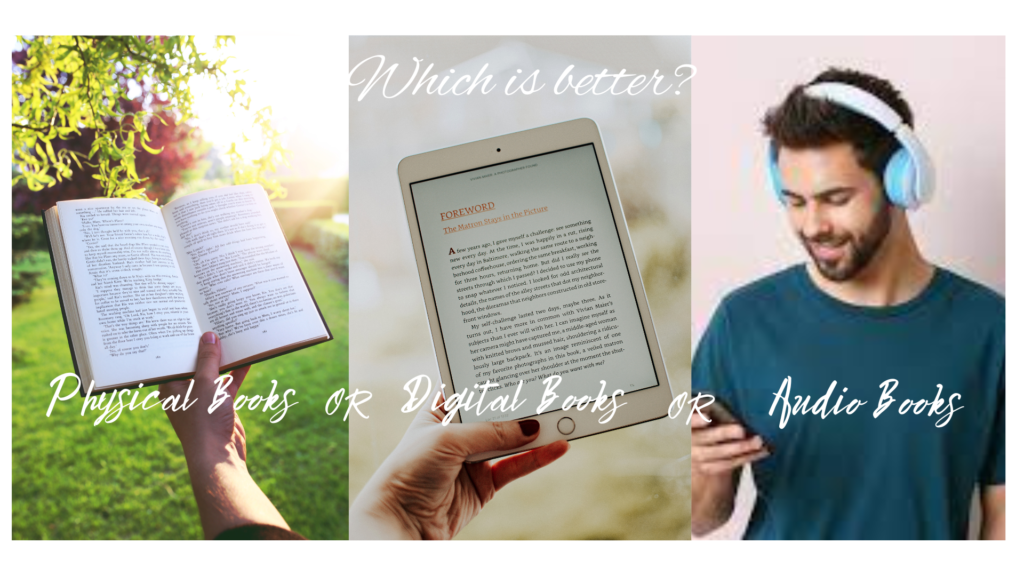
In a world brimming with technological advancements, the way we engage with literature has undergone a significant transformation. Traditional physical books have found themselves in a tug-of-war with their digital and audio counterparts. This article delves into the pros and cons of physical books, digital books, and audio books, offering a glimpse into the unique experiences each format brings to the table.
1. Physical Books: The Tangible Treasures
Physical books are the timeless relics that have graced bookshelves for centuries. The act of flipping through paper pages, the scent of ink and paper, and the tactile sensation of holding a book in your hands are cherished by many.
Advantages:
- Sensory Delight: Physical books offer a sensory experience that’s unmatched by their digital counterparts. The rustling of pages and the weight of a book can evoke nostalgia and a sense of intimacy.
- Eye Comfort: Reading from paper is less straining on the eyes compared to screens, making it a preferred choice for extended reading sessions.
- Disconnect from Technology: Physical books provide a break from screens, allowing readers to immerse themselves fully in the text without distractions.
Disadvantages:
- Space Constraints: Accumulating physical books can quickly lead to storage challenges, especially in today’s compact living spaces.
- Portability: Carrying multiple books can be cumbersome, limiting the number of titles you can read on the go.
- Environmental Impact: The production of paper books contributes to deforestation and pollution.
2. Digital Books: Carrying Libraries in Your Pocket
With the rise of e-readers, tablets, and smartphones, digital books have become a convenient and space-saving way to enjoy literature.
Advantages:
- Portability: A single device can store numerous books, allowing you to carry an entire library wherever you go.
- Adjustable Text: Digital books often allow readers to customize font size, style, and background color, catering to individual reading preferences.
- Instant Access: With a stable internet connection, you can instantly purchase and download books, eliminating the need to visit physical stores or wait for deliveries.
Disadvantages:
- Screen Strain: Prolonged screen exposure can lead to eye strain and fatigue, affecting the reading experience.
- Digital Distractions: Notifications and apps on devices can interrupt reading sessions, making it challenging to maintain focus.
- Lack of Tangibility: The absence of physicality can make some readers feel detached from the story and miss the tactile sensations of holding a book.
3. Audio Books: Stories Spoken to Life
Audio books provide a unique way to consume literature by letting you listen to narrated stories.
Advantages:
- Multi-Tasking: Audio books allow you to engage in other activities, like commuting, exercising, or doing chores, while still enjoying a good book.
- Narration Enhancement: A skilled narrator can add depth to characters and emotions, enhancing the storytelling experience.
- Accessibility: Audio books cater to visually impaired individuals and those who struggle with traditional reading.
Disadvantages:
- Pacing Control: Unlike physical or digital books, the pace of the narration is predetermined, leaving no room for personal reading speed.
- Comprehension: Some readers might find it harder to retain information and engage deeply with the material through audio alone.
- Limited Annotations: It’s more challenging to highlight or make notes in audio books compared to physical or digital formats.
The debate between physical books, digital books, and audio books ultimately boils down to personal preferences and circumstances. Each format has its unique advantages and drawbacks, catering to different reading styles and lifestyles.
If you seek the sensory pleasure of turning pages and the nostalgia of a bygone era, physical books are your companions. For those who prioritize portability and the convenience of an entire library in their pocket, digital books fit the bill. And if you’re constantly on the move or enjoy multitasking, audio books offer a way to immerse yourself in literature while accomplishing other tasks.
The beauty of this evolving landscape is that you don’t have to commit to just one format. You can mix and match based on your mood, activity, and preference. Whichever format you choose, the most important thing is to keep the love for reading alive in this ever-changing world.
Please do share in the comments which format do you prefer the most and why.
Varsha, you, have so well summarised the pros and cons of physical books, digital books, and audio books which offer a glimpse into the unique experiences each format brings to the table and the fact that one shouldn’t have to commit to just one format but can mix and match based on their mood, activity, and preference.
Love this line “The most important thing is to keep the love for reading alive in this ever-changing world”
Thank you so much 🙂 Glad you liked the post.